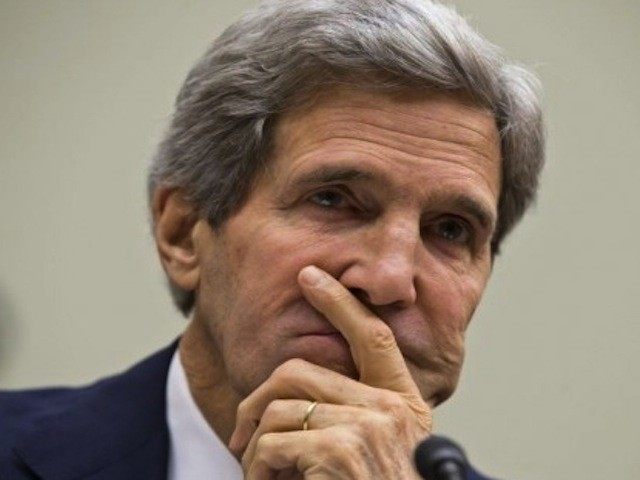The annual State Department report on global human rights found 2014 to be a particularly dire year for individual rights, largely due to terrorist organizations like the Islamic State and Boko Haram. Atop the list of offenders, however, were also rogue states that President Obama has made the cornerstone of his diplomatic efforts: Iran and Cuba.
In a statement on the report, Secretary of State John Kerry attempted to claim that the exhaustive report would bring bad news to every nation: “every country including the United States has room to improve.” A cursory look at each country’s report, as well as the report’s Executive Summary, makes clear that nations with which Kerry has insisted the United States strengthen ties are among the world’s greatest offenders.
Iran, an Islamist state with which Secretary Kerry has been negotiating a nuclear weapons deal for months, and Cuba, a communist autocracy that President Obama has argued should be treated as legitimate in order to “more effectively stand up for our values and help the Cuban people help themselves,” are cited for a plethora of human rights violations.
The State Department notes that the major human rights violations in Iran include, but are not limited to, several things:
[They were] severe restrictions on civil liberties, including the freedoms of assembly, speech, religion, and press; limitations on the citizens’ ability to change the government peacefully through free and fair elections; and disregard for the physical integrity of persons, whom authorities arbitrarily and unlawfully detained, tortured, or killed.
The Cuban government, meanwhile, is cited for “abridgement of the ability of citizens to change the government and the use of government threats, extrajudicial physical assault, intimidation, violent government-organized counter-protests against peaceful dissent, and harassment and detentions to prevent free expression and peaceful assembly.”
The complete lack of improvement in Iran regarding human rights may be a disappointment to some who expected President Hassan Rouhani to live up to his Western media reputation of being a “reformer,” cultivated through remarks such as “women are not second-class citizens” and “historians should reflect on” whether the Holocaust actually happened. Instead of an improved human rights landscape, Iran has extensively increased the number of executions in prisons during its tenure. Iran also holds three Americans hostage in its prisons: Washington Post reporter Jason Rezaian, former U.S. marine Amir Hekmati and Christian pastor Saeed Abedini.
“I can’t say that we have seen any meaningful improvement in the human rights situation in Iran,” said Tom Malinowski, U.S. assistant secretary of state for human rights.
Secretary Kerry has said he is “troubled” by Abedini’s case, whose crime was to attend and organize Christian gatherings in private homes. Abedini marked his 1,000th day in prison, where he has been subject to beatings and torture, on Thursday. Kerry is expected in Vienna on Friday to resume nuclear talks with the Islamist regime.
Cuba is also being cited for violating the rights of Christians, despite the fact that the Vatican has been supportive of the Castro regime, with Archbishop of Havana Jaime Ortega even falsely claiming that no political prisoners exist in Cuba. Every Sunday, hundreds of women are arrested throughout Cuba for wearing white to Catholic mass. The Ladies in White (Damas de Blanco), as they are called, dress so because they are the mothers, daughters, sisters, and wives of political prisoners. Their public presence is considered enough of a threat to have them arrested.
The State Department notes that, once in prison, “the government sometimes placed healthy prisoners, including political prisoners, in cells with mentally disturbed inmates as punishment. Political prisoners also reported being threatened or harassed by fellow inmates whom they believed were acting on orders of prison authorities.”
The United States removed Cuba–though not Iran, yet–from its State Sponsors of Terrorism list in April, despite strong ties between Cuba and the Revolutionary Armed Forces of Colombia (FARC), the world’s wealthiest non-jihadist terror group, and Lebanese/Iranian Shiite terrorist group Hezbollah. On Thursday, the State Department hosted a Twitter Q&A to answer questions from American citizens looking to travel to Cuba recreationally.

COMMENTS
Please let us know if you're having issues with commenting.